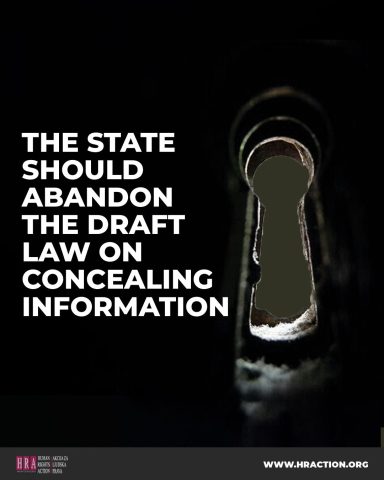
CIVIC EDUCATION INSPIRES YOUTH TO ACTIVELY PARTICIPATE IN SOCIETY
01/06/2025
N8.T1 – The Appellate Court Confirms: Seven Months in Prison for Prosecutor Mitrović
06/06/2025THE STATE SHOULD ABANDON THE DRAFT LAW ON CONCEALING INFORMATION

The Human Rights Action (HRA) is hereby warning the Parliament of Montenegro not to vote for the Draft Law on Amendments and Supplements to the Law on the Capital Market because of its controversial Articles 92a and 93b, which make it possible to disproportionately restrict freedom of expression in terms of the right to access information.
The HRA once again expresses its concern about the practice of the Government, that is, the representatives of the ruling majority, of submitting for adoption draft laws that restrict human rights without public discussion. This practice points to the need to introduce preventive control of the constitutionality of laws by the Constitutional Court, i.e. the control of constitutionality at the request of a certain number of deputies before the laws enter into force.
The disputed Articles 92a and 93b of the Draft Law on Amendments and Supplements to the Law on the Capital Market – which, although differently titled, contain a literally identical text, prohibit the “publication of material information and other data in the media and at public gatherings if such publication could affect the willingness of potential investors to purchase government debt securities.” “Material information” is defined as any information “of strategic importance that could impact the price of public debt on the domestic and international capital markets”. The ban on publication is valid from the moment of preparation of the emission until the official announcement of the Ministry of Finance about its conclusion.
This particular wording opens too wide a space for prohibiting publication and access to information about e.g. the amount of public debt, the possible economic risks, dubious investments, fiscal instability or political uncertainty, that is, about all that is necessary to obtain a realistic picture of the state of affairs in a country. This directly limits the freedom of expression, the right to information, and public oversight of the work of the government. Additionally, in terms of the duration of the ban, the public cannot know when the process of issuing government debt securities begins, as this too is often declared confidential information.
The issue here is, therefore, a disproportionate restriction of freedom of expression, which puts the market interests of the state above the right of the public – including potential foreign investors in government debt securities – to be informed about its financial operations. Such a restriction is not necessary in a democratic society and is therefore not harmonised with Article 10 of the European Convention on Human Rights or the Constitution of Montenegro. On top of that, it will certainly act as a deterrent to foreign investors because it shows Montenegro as a non-transparent country.
Although the Constitution of Montenegro (Article 51, Paragraph 2) envisages the possibility of limiting access to information held by state authorities and organisations exercising public powers when this is in the interest of conducting monetary and economic policy, the Convention of the Council of Europe on access to official documents (Article 3) prescribes that, in a democratic society, such a limitation must be subjected to the test of necessity. The Draft Law does not provide for the application of such a test, which contradicts not only the provisions of the Convention, but also the Law on Free Access to Information (Article 16) which requires an assessment of the harm that could be caused by publication in relation to the public interest.
For years now, civil society and the media have been warning about the consequences of the adoption of draft laws that are contrary to Montenegro’s Constitution and international obligations. Although, since taking office, the President of Montenegro Jakov Milatović has tried to prevent possible unconstitutional solutions by refusing to sign the adopted laws, this power of the President of the State alone is not an effective mechanism of control of constitutionality. In practice, it has been shown that almost all returned laws are later adopted containing the identical text.
The HRA proposes to consider introducing the jurisdiction of the Constitutional Court for preventive control of the constitutionality of laws, which already exists in some European countries (e.g. in France, Poland, Germany, Serbia and Romania), as this could prevent the negative consequences of unconstitutional legal solutions and effectively protect the basic rights of citizens and fundamental constitutional values.







 English
English